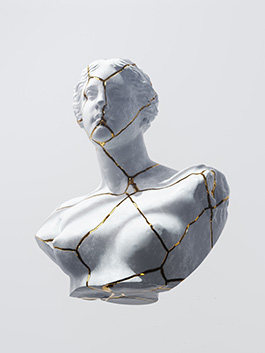First and Second Things
- C.S. LEWIS
Until quite modern times—I think, until the time of the Romantics—nobody ever suggested that literature and the arts were an end in themselves.
 They "belonged to the ornamental part of life", they provided "innocent diversion"; or else they "refined our manners" or "incited us to virtue" or glorified the gods. The great music had been written for Masses, the great pictures painted to fill up a space on the wall of a noble patron's dining-room or to kindle devotion in a church; the great tragedies were produced either by religious poets in honour of Dionysus or by commercial poets to entertain Londoners on half-holidays.
They "belonged to the ornamental part of life", they provided "innocent diversion"; or else they "refined our manners" or "incited us to virtue" or glorified the gods. The great music had been written for Masses, the great pictures painted to fill up a space on the wall of a noble patron's dining-room or to kindle devotion in a church; the great tragedies were produced either by religious poets in honour of Dionysus or by commercial poets to entertain Londoners on half-holidays.
It was only in the nineteenth century that we became aware of the full dignity of art. We began to "take it seriously" … But the result seems to have been a dislocation of the aesthetic life in which little is left for us but high-minded works which fewer and fewer people want to read or hear or see, and "popular" works of which both those who make them and those who enjoy them are half ashamed … by valuing too highly a real, but subordinate good, we have come near to losing that good itself.
The longer I looked into it the more I came to suspect that I was perceiving a universal law … The woman who makes a dog the centre of her life loses, in the end, not only her human usefulness and dignity but even the proper pleasure of dog-keeping. The man who makes alcohol his chief good loses not only his job but his palate and all power of enjoying the earlier (and only pleasurable) levels of intoxication. It is a glorious thing to feel for a moment or two that the whole meaning of the universe is summed up in one woman—glorious so long as other duties and pleasures keep tearing you away from her. But clear the decks and so arrange your life (it is sometimes feasible) that you will have nothing to do but contemplate her, and what happens? Of course this law has been discovered before, but it will stand re-discovery. It may be stated as follows: every preference of a small good to a great, or partial good to a total good, involves the loss of the small or partial good for which the sacrifice is made.
Apparently the world is made that way … You can't get second things by putting them first; you can get second things only by putting first things first.
 This is Meaghen Gonzalez, Editor of CERC. I hope you appreciated this piece. We curate these articles especially for believers like you.
This is Meaghen Gonzalez, Editor of CERC. I hope you appreciated this piece. We curate these articles especially for believers like you.
Please show your appreciation by making a $3 donation. CERC is entirely reader supported.

Acknowledgement
 C.S. Lewis. "First and Second Things," God in the Dock. William B. Eerdmans Publishing Company (1970).
C.S. Lewis. "First and Second Things," God in the Dock. William B. Eerdmans Publishing Company (1970).
Published under fair use. Image credit: Photo by SIMON LEE on Unsplash.
The Author

 Clive Staples Lewis (1898-1963), commonly called C. S. Lewis was a novelist, poet, academic, medievalist, literary critic, essayist, lay theologian, and Christian apologist. Born in Belfast, Ireland, he held academic positions at both Oxford University (Magdalen College), 1925-1954, and Cambridge University (Magdalene College), 1954-1963. He is best known both for his fictional work, especially The Screwtape Letters, The Chronicles of Narnia, and The Space Trilogy, and for his non-fiction Christian apologetics, such as Surprised by Joy: The Shape of My Early Life, Mere Christianity, Miracles, The Weight of Glory, and The Problem of Pain.
Clive Staples Lewis (1898-1963), commonly called C. S. Lewis was a novelist, poet, academic, medievalist, literary critic, essayist, lay theologian, and Christian apologist. Born in Belfast, Ireland, he held academic positions at both Oxford University (Magdalen College), 1925-1954, and Cambridge University (Magdalene College), 1954-1963. He is best known both for his fictional work, especially The Screwtape Letters, The Chronicles of Narnia, and The Space Trilogy, and for his non-fiction Christian apologetics, such as Surprised by Joy: The Shape of My Early Life, Mere Christianity, Miracles, The Weight of Glory, and The Problem of Pain.




